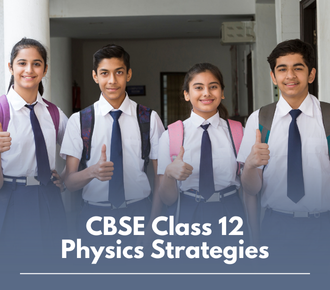- 9:30am - 6:30pm, Mon - Sun
- +91 7836034313
- R2-149 first floor M3M Cosmopolitan, sector 66 Gurugram 122102

Physics is one of the most scoring yet challenging subjects in CBSE Class 12. With numerous derivations, numerical problems, and conceptual questions, it requires a clear strategy to score well. This blog post is tailored to help you prepare efficiently with structured notes, chapter-wise priority, actionable tips, past year questions (PYQs), mistakes to avoid, and a downloadable checklist. This guide is exam-focused and helps you cover the entire syllabus without confusion.
You can also connect with expert teachers through [/tutors], start learning with a [/free-trial], explore affordable plans at [/pricing], or find home tutors in Gurugram through [/city/gurugram/home-tutor]. This comprehensive guide will ensure you stay organized and confident throughout your preparation.
Before you start your preparation, it is essential to be fully aware of the syllabus. The CBSE Class 12 Physics syllabus covers both theoretical concepts and numerical problems that demand practice.
Electrostatics
Electric field and potential
Capacitance and dielectrics
Current Electricity
Ohm’s law
Kirchhoff’s laws
Magnetic Effects of Current and Magnetism
Biot-Savart law
Ampere’s circuital law
Electromagnetic Induction and Alternating Currents
Faraday’s law
Self and mutual induction
Electromagnetic Waves
Characteristics and propagation
Optics
Reflection and refraction
Wave optics
Dual Nature of Radiation and Matter
Photoelectric effect
Matter waves
Atoms and Nuclei
Atomic structure
Radioactivity
Semiconductor Electronics
Diodes and transistors
Applications in circuits
Understand derivations, not just memorize them.
Practice numerical problems daily.
Revise formulas frequently.
Focus on diagrams and graph-based questions.
Some chapters carry more weight in exams and are conceptually important. Here’s a recommended chapter priority for efficient learning.
Electrostatics – Definitions, field concepts, potential problems.
Current Electricity – Kirchhoff’s laws and numericals.
Magnetic Effects of Current and Magnetism – Biot-Savart law and field lines.
Electromagnetic Induction and Alternating Currents – Self-induction and transformer problems.
Optics – Ray optics, wave optics derivations and diagrams.
Electromagnetic Waves – Propagation concepts.
Atoms and Nuclei – Radioactive decay and atomic models.
Dual Nature of Radiation and Matter – Photoelectric effect, Compton scattering.
Semiconductor Electronics – Diodes, transistors and circuit diagrams.
Semiconductor applications – Less conceptual focus.
Some advanced numericals – Practice selectively.
Divide the syllabus by topics and assign each one a specific day. For example, cover Electrostatics formulas on Day 1, Current Electricity problems on Day 2, etc.
Physics requires consistent problem-solving practice. Solve problems from both NCERT and previous years’ question papers.
Create formula sheets and keep revising them at least twice a week. Ensure you understand the logic behind derivations.
Neat diagrams with proper labeling earn marks. Practice drawing diagrams daily, especially in Optics and Magnetism.
Group studies help clarify doubts. Teaching concepts to peers helps strengthen your own understanding.
Set a timer and attempt full-length mock papers to simulate exam conditions. Review your mistakes and correct them.
Maintain a checklist to track which chapters are completed, which numericals need practice, and which doubts are pending.
Practicing PYQs ensures you are exam-ready and aware of the question patterns.
Derive the expression for electric potential due to a point charge.
Explain Gauss’s law with examples.
Numericals involving electric field intensity.
Kirchhoff’s rules and their application.
Derive the expression for equivalent resistance in series and parallel circuits.
Explain heating effects of electric current.
Explain the Biot-Savart law.
Derive the expression for magnetic field on the axis of a current-carrying loop.
Discuss the magnetic properties of materials.
Explain Faraday’s law and Lenz’s law.
Derive the expression for mutual inductance.
Explain AC circuits and reactance.
Derive the mirror equation.
Explain diffraction and interference with diagrams.
Practice ray diagrams of lenses and prisms.
Derive Einstein’s photoelectric equation.
Explain radioactive decay and half-life numericals.
Practice problems involving Compton effect.
Physics requires problem-solving practice. Avoid neglecting numericals as they carry significant marks.
Many students stop at the formula without writing all steps. Write each step carefully.
Skipping diagrams reduces marks even if the theory is correct.
Memorization without comprehension leads to mistakes in application-based questions.
A once-and-done study approach doesn’t work. Revise formulas, problems, and definitions weekly.
Allocate time wisely between long and short questions. Avoid spending too much time on one problem.
Always write correct units and round off numbers as per instructions.
You can download the checklist from [/city/gurugram/home-tutor]. This checklist helps you stay focused and track your study progress.
✔ Chapters covered
✔ Numerical problems solved
✔ Derivations practiced
✔ Diagrams drawn and labeled
✔ Weekly revision done
✔ Mock tests attempted
✔ Doubts clarified with tutors
✔ Time management tracked
Use this checklist every week to plan your studies and ensure you cover all important topics before exams.
Our tutors help you create study schedules tailored to your strengths and weaknesses.
Clarify doubts instantly during one-on-one sessions.
Get customized practice sets and regular tests with feedback.
Learn at your pace with online or in-person classes. Find tutors near you at [/city/gurugram/home-tutor].
Get started with a [/free-trial] and explore detailed plans at [/pricing].
CBSE Class 12 Physics demands discipline, conceptual clarity, and problem-solving skills. By following this guide with structured notes, chapter priority, actionable tips, PYQs, mistakes to avoid, and a downloadable checklist, you will be well-prepared to face the exam confidently.
Stay consistent with your studies, revise regularly, and practice numericals to boost your performance. Make use of expert support by exploring tutors at [/tutors], beginning with a [/free-trial], checking plans at [/pricing], and finding local support through [/city/gurugram/home-tutor].
With the right strategy, Physics can be one of your strongest subjects. Stay focused, practice daily, and approach the exam with confidence!








